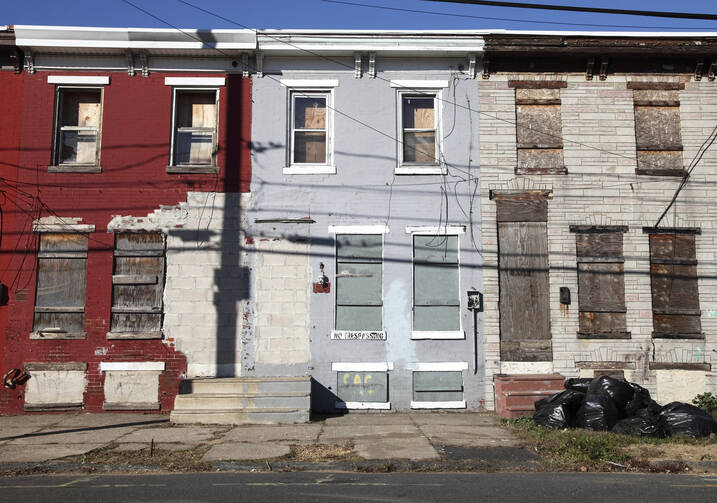Good jobs and decent wages lead to stronger families, which leads to peaceful and stable societies, and Catholics have an obligation to provide assistance to those struggling financially while simultaneously urging their lawmakers to enact just employment laws.
That’s the message U.S. bishops are promulgating in their annual Labor Day statement, in which they also bemoan empty political promises and the lack of opportunity for middle and low-income Americans.
“Millions of families still find themselves living in poverty, unable to work their way out,” says the letter, written by Archbishop Thomas G. Wenski of Miami, in anticipation of the Sept. 5 holiday.
A lack of opportunity, it continues, has contributed to the breakdown of family life, often at the hands of divorce and substance abuse.
“The Rust Belt region now appears to have the highest concentration in the nation of drug-related deaths, including from overdoses of heroin and prescription drugs,” it says.
With the presidential election now about 12 weeks away, the letter takes aim at politicians for trying “to divide as a means to gain support.”
“When our leaders ought to be calling us toward a vision of the common good that lifts the human spirit and seeks to soothe our tendencies toward fear, we find our insecurities exploited as a means to further partisan agendas,” it says.
“Our leaders must never use anxiety as a means to manipulate persons in desperate situations, or to pit one group of persons against another for political gain,” it continues. “For our dynamics to change, we must replace fear with a fuller vision that can be powerfully supported by our faith.”
The letter makes just passing reference to labor unions, calling them “imperfect” but conceding that they “remain an essential part of the effort, and people of faith and goodwill can be powerful leaven to ensure that these groups, so important in society, continue to keep human dignity at the heart of their efforts.”
The Catholic Church has historically been one of the stronger supporters of labor unions in the United States, though that fervor has seemed to wane in recent years.
For example, after the National Labor Relations Board ruled that adjunct faculty members had the right to organize, some Catholic universities fought unionization efforts on their campuses, citing religious freedom concerns.
RELATED: A Bad Case of Jesuit Adjunctivitis?
Just this week, the N.L.R.B. ruled that graduate students who teach classes also have the right to organize, which could launch more battles on Catholic campuses.
Still, some prominent Catholic leaders remain supportive of unions.
Chicago’s Archbishop Blase Cupich, for instance, spoke to the Chicago Federation of Labor last September, as Republican leaders in Illinois work to enact “right to work laws” that critics say weaken worker protections and to dismantle the state’s very powerful public-sector unions.
“I have come today to tell Chicago workers the Catholic Church is with you,” Cupich told the crowd.
“Lawmakers and others may see it differently, but history has shown that a society with a healthy, effective and responsible labor movement is a better place than one where other powerful economic interests have their way and the voices and rights of workers are diminished,” he continued.
About half of all Americans hold a favorable view of labor unions, the Pew Research Center found in 2015, a number that’s remained stable in recent decades. But the number of people in private and public-sector unions has plummeted since the 1980s.
In 1983, one in five U.S. workers belonged to a union. By 2014, that number had fallen to about one in 10.
The church is not immune to wider trends, either.
According to a new report by the Catholic Labor Network, about 500 Catholic workplaces in the country are unionized.
That number represents a relatively low share of the total number of Catholic institutions in the United States, since there are some 6,800 schools, 630 hospitals and more than 240 colleges and universities.
The vast majority of unionized workers are in three distinct fields: health care, K-12 education and college education, with a smaller cluster in social services and other service professions.
“Catholic social teaching endorses the right of workers to form labor unions and calls upon labor and management to establish cooperative relationships to advance their craft and the common good,” said Clayton Sinyai, the report’s author, in “The ‘Gaudium et Spes’ Labor Report,” issued in mid-August.
Archbishop Wenski’s letter highlights the church’s teachings on solidarity and subsidiary, the notion that solutions to societal problems should begin at the local level, laying out steps Catholics can take to support better labor opportunities.
At the local level, that means offering those struggling with finding employment “food, money, counsel, friendship, spiritual support or other forms of love and kindness.”
The letter also reminds employers to treat workers fairly.
“If you are an employer, you are called to respect the dignity of your workers through a just wage and working conditions that allow for a secure family life,” it says.
Zooming out, the letter urges Catholics to work in the political sphere to “advocate for jobs and wages that truly provide a dignified life for individuals and their families, and for working conditions that are safe and allow for a full flourishing of life outside of the workplace.”
Last year, Archbishop Wenski and Sister Donna Markham, president of Catholic Charities USA, wrote to federal lawmakers urging an increase in the federal minimum wage, which currently stands at $7.25 per hour.
Material from the Catholic News Service was used in this report. Michael O’Loughlin is the national correspondent for America. Follow him on Twitter at @mikeoloughlin.







